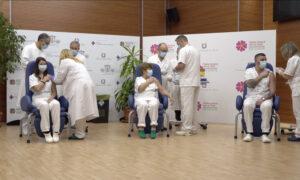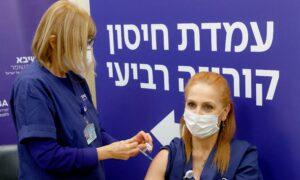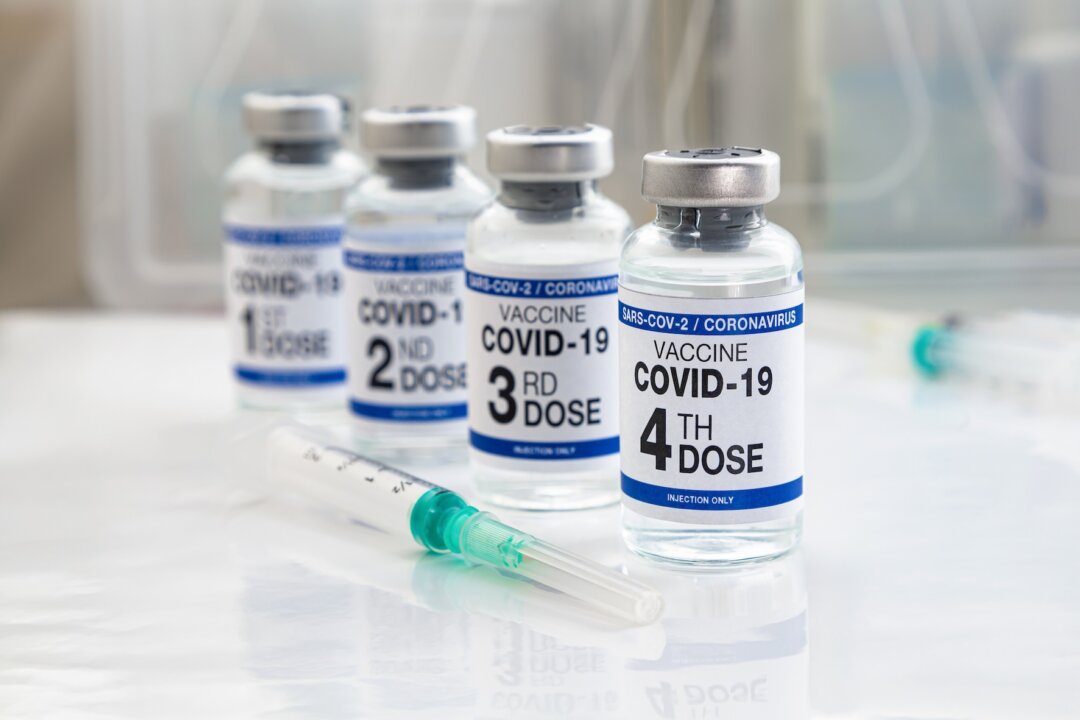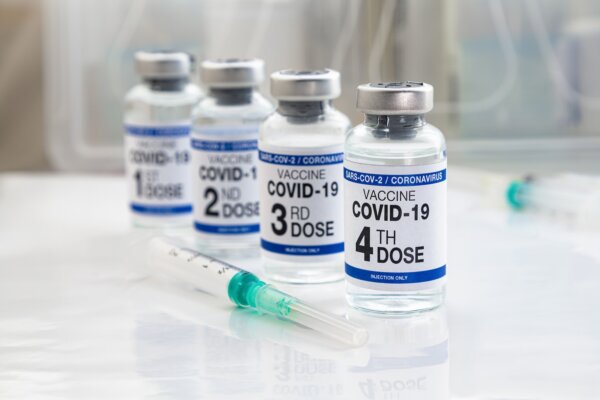4th Vaccine Dose Showed Negative Relative Vaccine Efficacy Against COVID Death: Study
An Austrian study showed more COVID-19 deaths among individuals who received four vaccine doses than among those who received fewer doses or no vaccinations.
A fourth dose of the COVID-19 vaccine may not be as effective as expected, according to a recent peer-reviewed study.
The retrospective population-based observational study published in the European Journal of Clinical Investigation used national health data from the Austrian epidemiological reporting system, individual all-cause mortality data from Statistics Austria, and the national COVID-19 vaccine registry.
Researchers calculated COVID-19 deaths and SARS-CoV-2 infections from Nov. 1 to Dec. 31, 2022, in 3,986,312 individuals, comparing the outcomes of 281,291 who received four vaccine doses with 1,545,242 individuals who received three vaccine doses to determine relative efficacy.
According to the CDC, relative vaccine effectiveness is measured by comparing people who received one vaccine type or regimen to those who received a different one.
During the initial study period, researchers recorded 69 COVID-19 deaths, 89,056 SARS-CoV-2 infections, and an overall case fatality rate of 0.08 percent. Relative vaccine efficacy for four doses was negative 24 percent compared with those who received three vaccine doses. Additionally, researchers found more COVID-19 deaths among individuals who received four vaccine doses than among those who received fewer vaccine doses or no vaccinations.
“Negative efficacy basically means [there were] more deaths (or illnesses) in the vaccinated group compared to the unvaccinated group. Efficacy is a “delta” of unvaccinated deaths minus vaccinated deaths. Once vaccinated deaths exceed unvaccinated deaths, the delta becomes negative, and that yields a negative efficacy,” Brian Hooker, chief scientific officer at Children’s Health Defense, who holds a doctorate in biochemical engineering, told The Epoch Times in an email.
There was a 17 percent reduced risk among those who received four vaccine doses. However, the initial decreased risk of infection “rapidly diminished” and reversed itself in a six-month extended follow-up, leaving individuals who received four doses with a higher risk of infection than less vaccinated individuals.
Those with repeated previous and recent infections experienced significantly reduced reinfections, regardless of the vaccine dose.
More than 80 percent of vaccinated Austrians had received Pfizer’s COVID-19 vaccine during the initial study period, and 97.4 percent of individuals who had received four vaccine doses in the extended observation had received Pfizer’s vaccine.
Extended Study Period Shows Negative Effects of 4th Vaccine Dose
An extended observation period was added through June 30 to increase statistical power. On Jan. 1, at the start of the extended observation period, the group sizes of those who received four, three, one to two, and no vaccinations were 490,623, 1,352,471, 911,896, and 1,223,216, respectively. During this extended study period, researchers recorded 225 COVID-19 deaths and 174,174 SARS-CoV-2 infections.
No significant differences for COVID-19 mortality were found in other groups, but fewer infections existed in the less vaccinated groups.
Initially, those with four doses had a 17 percent lower risk of COVID-19 infection compared with those who had three doses. However, during the extended follow-up period, they became more likely to experience an infection compared with those who received fewer vaccinations. Any benefit they did receive initially rapidly waned—a finding similar to a March 2023 study. In this study, the relative vaccine efficacy of a third vaccine dose was 61.4 percent in the first month of follow-up and gradually declined to a relative vaccine efficacy of negative 45.7 percent.
A similar 2021 study from Qatar published in the New England Journal of Medicine examined infections among this nation’s highly vaccinated population, most of whom received Pfizer’s COVID-19 vaccine. Vaccine effectiveness against SARS-CoV-2 infection was negligible the first two weeks after the first Pfizer dose, increased to 36.8 percent in the third week after the first dose, and peaked at 77.5 percent in the first month after the second dose.
Researchers found that effectiveness builds quickly after a first dose, peaks during the first month after a second dose, and declines gradually in subsequent months.
“The waning appears to accelerate after the fourth month, to reach a low level of approximately 20% in subsequent months,” authors Laith Abu-Raddad of Weill Cornell Medicine–Qatar and colleagues wrote. By the end of the study, breakthrough infections reached 36.4 percent, with 77.2 percent of infections attributed to Pfizer’s COVID-19 vaccine.
‘Healthy Vaccinee Bias’ May Lead to Inflated Efficacy Claims
Researchers in the Austrian study recorded 1,568 all-cause deaths in individuals who received four vaccine doses, 1,748 in those who received three doses, 607 deaths in those who received one to two doses, and 556 all-cause deaths in the unvaccinated during the initial study period.
Compared to individuals with three vaccinations, the age and gender-adjusted hazard ratio for all-cause mortality in those with four, one to two, and no vaccinations was 0.79, 1.17, and 0.93, respectively. Researchers noted the reduced infection risk did not translate to preventing COVID-19 deaths, according to their data.
They observed a 21 percent lower all-cause mortality risk in those receiving four vaccine doses than those receiving only three doses. However, when nursing home residents—who are at a higher risk of death due to age and comorbidities—were excluded, the number jumped to 37 percent, suggesting “healthy vaccinee bias.”
Healthy vaccinee bias assumes that individuals who are healthier and have lower risks of certain diseases are more likely to get vaccinated, while those in poorer health are less likely to be vaccinated.
As reported by The Epoch Times in July, an individual’s underlying health plays a significant role in COVID-19-related mortality. If a particular group consisted of individuals with fewer health conditions that weren’t accounted for in the data, it would be inaccurate to attribute lower mortality to a fourth dose of a COVID-19 vaccine.
“Healthy vaccinee bias may cause overestimation of rVE [relative vaccine efficacy], but this would not materially alter our findings, as we have not observed a protective effect for COVID-19 deaths anyhow,” the researchers wrote.
The authors of this study say it raises questions about whether recommendations for repeated vaccine boosters against COVID-19 are currently justified for the larger general population with a history of previous infections.
This article has been archived for your research. The original version from Epoch Times can be found here.






